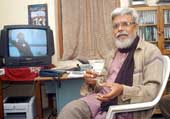 |
| Meghnath at his residence in Ranchi. Picture by Prashant Mitra |
With his grey beard, white kurta-pyjama and characteristic jhola, Meghnath looks every bit a social activist.
Nearly in his 50s, Meghnath is a straightforward person who does not like to mince his words to please others. A Bengali raised in Mumbai, he moved to Ranchi to work as a journalist. He had also been a member of the JP movement.
Meghnath?s interest in cinema as a medium of expression has its roots in his social commitment.
He belongs to the school which believes that cinema conjures up a symbolic reality that may or may not have a bearing on the social and political imagery that the state would like people to think as true. Cinema portrays and propagates social issues more effectively than other media, he feels.
Meghnath, who has been an activist for the past 25 years, started making films to satisfy his passion for issues rather than the glamour of ?making films?.
?I was influenced by the films of Ritwik Ghatak, which were based on social communication, and influenced while working under film personalities like Suhasini Mule (you may remember her as the young wife from Bhuban Shome) and Tapan Bose. My adventures in filmmaking started in Delhi and continued in Ranchi, where I collaborated with some youths and made Akhra. Films were an attractive medium in the 1970 and 1980s, as there were very few other platforms for us to raise issues,? he adds.
Initially, Meghnath ventured into the film world using journalistic themes. Hardcore issues and problems of the time were what he was interested in.
His film, Development Comes From the Barrel of the Gun, dealt with the displacement of the indigenous people of Orissa, forced to leave due to industrialisation. When they revolted or made any attempts to do so, the administration?s bullets suppressed their voices.
Meghnath derived his inspiration to make a film based more or less on a tribal theme from an Australian crew whom he met during a film festival in Kathmandu.
?I had asked them why they were inclined to make small-budget films, that too using their own money. I was really glad with the answer. They said since the biggest producer, Hollywood, had turned its back on human stories, it was up to the small players like them to teach them lessons in humanity. That?s when I thought that I could do the same,? he adds with a smile.
If one believes that all Meghnath?s films are dark and dreary, think again. Because, as a director, he is also inspired by music. His film Gadi Lohardaga Mail is a musical journey on the narrow gauge train from Ranchi to Lohardaga.
Meghnath joined the likes of Sunil Minz, Xavier Kujur and Biju Toppo in his quest to make quality cinema on tribal issues.
Another of his creations, Kora Rajee, is a documentary on the Adivasis of Jharkhand who had migrated to Assam in the early 1930s.
Earlier, Meghnath had worked with renowned documentary filmmaker Anand Patwardhan of War and Peace fame and Mule. ?Both have taught me the nuances of filmmaking since I have worked with them as assistant director.?
The speciality of Meghnath?s films is that he experiments with a new theme every time. Recognition came his way when Kora Rajee, was screened in the Toronto Film Festival as well as the South Asia Film Festival in Kathmandu.
Meghnath is so passionate about films that he has got a library of rare classics like the Bicycle Thief and The Mother.
His collection includes French, Russian, Spanish and English films. In his leisure time, Meghnath watches these films. He also reads books related to films, filmmakers and their techniques. The knowledge and experience of Meghnath is being utilised by many professional and amateur filmmakers.
?Since I have used different media, youngsters come to me to share their experiences and knowledge,? Meghnath signs off.
Abhijeet Mukherjee










